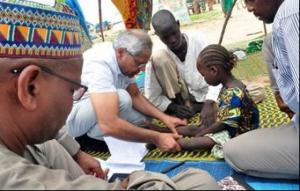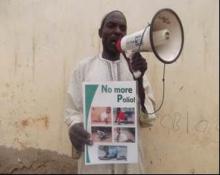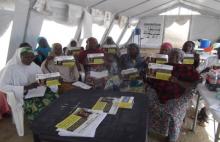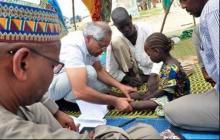Borno State Commissioner for Health applauds surveillance network for braving insurgency
Maiduguri, 18 October 2016 - The Borno state Commissioner for Health, Dr Haruna Mshelia has described the efforts of the surveillance network in reporting acute flaccid paralysis (AFP) cases, including those that were later confirmed as wild polio viruses (WPVs) from insurgents’ enclaves, as “exceptional display of gallantry worthy of recognition”.
Dr Mshelia told development partners in Maiduguri that “the fact that AFP cases are reported even from the security challenged LGAs can only point to the fact that the surveillance system is far-reaching, beyond accessible areas”.
In his presentation, Dr Mahmud Saidu, the out-going WHO State Coordinator (SC) in Borno, mentioned that “in every recently accessible territory (RAT) liberated by the military, WHO supports the state to identify and train community informants on AFP case detection and timely reporting. Each informant is given posters and familiarized with the channel of reporting at the LGA or within IDPs camps”.
The SC also revealed that functioning health facilities are quickly turned into focal sites and the health workers in every health facility in the 34 IDP camps have been trained on AFP surveillance. Dr Mahmud further stated that “the gallantry of all health workers and community informants in the state is commendable especially those working in security challenged local government areas (LGAs) for the early detection of the current WPV outbreak in the state”.
Keeping vigilance to combat polio
Borno state bears most of the brunt of security challenges as a result of the Boko Haram insurgency. The insurgents’ attacks have led to the killing of health workers, destruction of health facilities, and displacement of huge populations, all of which culminated to impact negatively on polio eradication activities including surveillance.
Out of the 27 LGAs in the state, eight are now fully accessible, while the rest have varying degrees of accessibility. Indeed the four WPV cases in the current polio outbreak originated from LGAs (Gwoza, Jere and Monguno) with limited health service delivery access.
Monguno LGA accounted for two cases while Jere and Gwoza LGAs reported one case each. Monguno and Gwoza LGAs are only accessible to health workers with the support of the military. Even though Monguno has 12 wards, only one ward (Monguno) is accessible and even then, nine out of the 71 settlements of Monguno ward are not accessible. This lack of or partial accessibility applies to all the other 23 LGAs of the state. Use of motorcycles has been banned in Borno, thereby making active surveillance and supervision difficult for Disease Surveillance and Notification Officers (DSNOs).
The security challenges notwithstanding, surveillance network detect and report AFP cases in Borno as a result of the doggedness, resilience and innovations instituted and run by the surveillance system. For instance, the sensitivity of the AFP surveillance in the state as measured by the non-polio AFP rate during the period January to September 2016 was 21.3 (target of 3.0). During the same period in 2015, the non-polio AFP rate was 14.3.
Braving insurgency-tales of gallant health workers in Gwoza LGA
The story of Mohammed Audu, the ADSNO of Gwoza LGA represents a tale of hard work, commitment and heroism of the multitude of health workers who take unimaginable amount of risks to work in dangerous and security compromised areas in Borno state in order to achieve the goal of polio eradication.
“When Gwoza was liberated, I realized that I have a duty to serve my people as a health worker. I knew it was dangerous and have been warned by many people to desist from travelling to Gwoza. I usually go to Gwoza every fortnight and stay there for two weeks doing surveillance for AFP and other diseases as well as provide health services in the health facility”.
According to Audu his first trip to Gwoza was in September 2015 after the insurgents were dislodged by the military. He stated that the purpose of his trip was for immunization and surveillance. The ASNO said he was given 2000 doses of bivalent oral polio vaccines which was exhausted. At that time, Audu recalled the trip was far more dangerous. They started the trip at 9.00am in company of LGA chairman and Commissioner of Rehabilitation, Reconstruction and Resettlement with heavy military escort but could not reach Gwoza until 5.00pm. He stated that the military detonated five IEDs between Pulka and Gwoza, a stretch of only 24km.
On his part, Barkindo Yuguda the DSNO, who is supported by a retinue of orthodox and non-orthodox network of informants in conducting active case search for AFP, narrated that any trip to Gwoza after the military liberated the area was always a nightmare.
“As we set out from Maiduguri, my heart pounds endlessly until we reach our destination. I was not sure whether I would make it alive to Gwoza as I thought about the possibility of an ambush along the way since the road from Konduga to Gwoza is desolate and without any sign of human life. It is simply a no man’s land. Despite all these risks, I decided that we have a duty to our people. If others can go there to assist, why could I not do same?”, the DSNO narrated.
On arrival at the LGA, the surveillance team usually holds a brief meeting with all their informants to find out if they have any cases to report and to re-sensitize them prior to conducting household search within the community and IDPs camps.
Partnering to meet surveillance performance indicators
All the LGAs in the state have been able to meet the two key AFP surveillance indicators of non-polio AFP and stool adequacy rates in the past five years. Some of the strategies used in inaccessible areas to improve surveillance include partnership with security forces and local civilian vigilante groups, engagement of community informants, active surveillance by vaccination and hard to reach teams as well as rotational active surveillance by DSNOs and their assistants.
The state shares international borders with Cameroun, Chad, and Niger Republic and these neighboring countries are also affected by the insurgency. The possibility of cross border importations further makes it paramount that efforts at improving polio surveillance be intensified.
As a result of regular border synchronization meetings between states in Nigeria along international borders and their counterparts in neighbouring countries, in 2016, two AFP cases from Abadam LGA of Borno were detected from Niger Republic and an AFP case from Michika LGA of Adamawa state was detected in Cameroun. All these cases were jointly investigated.
It could be recalled that after close to two years without reporting any case of WPV, Nigeria experienced a setback in its effort to eradicate polio with recent confirmation of four WPV cases reported from three LGAs of Borno state. The last case of WPV had a date of onset of paralysis recorded as 21 August, 2016.
_________________________________________________
Technical contacts:
Dr Fiona Braka; Tel: +234 703 170 5252; Email: brakaf [at] who.int (brakaf[at]who[dot]int)
Dr Abdullahi Hamisu; Tel: +234 810 221 0191; Email: abdullahih [at] who.int (abdullahih[at]who[dot]int)
Media contact:
Ms Charity Warigon; Tel: +234 810 221 0093; Email: warigonc [at] who.int (warigonc[at]who[dot]int)
Dr Umar Mustapha; Tel: +234 803 616 9972; Email: umarm [at] who.int (umarm[at]who[dot]int)
_________________________________________________
01 Surveillance review team in Borno with WPV case in Jere LGA
02 A town announcer on community active surveillance
03 Surveillance sensitization in IDP camp clinic in Borno






